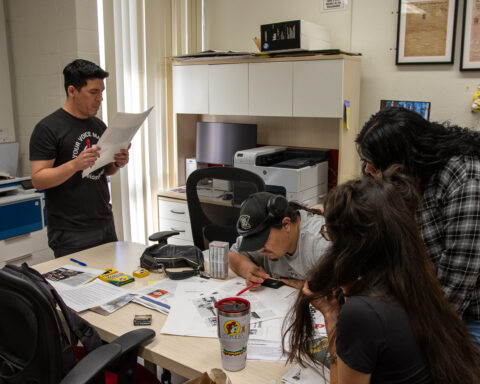Buzz, buzz, buzz. Freshman Guadalupe Sanchez rolls over and turns off her 6 a.m. alarm. She reaches for her phone and is greeted with a bright white glow.
Typically, other students would log onto TikTok or Instagram, but Sanchez clicks on the Orange County Transportation Authority app and checks when the next bus will be stopping by her corner.
This is how she starts each morning, checking the bus schedule to figure out how long she has to get ready. Sanchez then continues her day, getting dressed and saying goodbye to her mother and her siblings as they prepare to leave for work and school.
“I’ve commuted to school my whole life,” Sanchez said.
Sanchez is one of about 2,500 Santa Ana College students taking advantage of low-cost bus passes, included in their student fees. Without the program, monthly college passes for OCTA are $46, and a day pass is $5 or $2 per ride. Before the program launched seven years ago, many students struggled to continue their education because they could not afford the cost of transportation.
“The cost of a daily bus pass and a monthly bus pass gradually adds up to a significant sum. I greatly value the ability to save money,” Sanchez said.
Even before the pandemic, OCTA was experiencing issues such as a decrease in their bus ridership due to route changes and a cut in bus services. OCTA states ridership went down significantly, dropping from around 52.6 million in 2018, to 38.5 million.
OCTA decided to partner with SAC, creating a pilot program in August of 2017 to experiment with how bus passes might fix both issues. The result revealed that more students were able to attend SAC and take classes. According to 2018 data from OCTA, student riders were able to boost ridership by a significant amount. The results were so successful, OCTA decided to partner with SAC and make a Community College Pass.
Before working with SAC to create a pilot program, OCTA already had a working “U-Pass” program collaborating with the University of California at Irvine and Cal State Fullerton.
“SAC senior management expressed interest in an all-inclusive, low-cost program to allow every student to ride OC Bus, which inspired the pilot program at Santa Ana College,” said Eric Carpenter, OCTA’s media relations specialist.
The pilot went well, allowing OCTA to expand the program to all community colleges in Orange County. The first year was paid for by the Low Carbon Transit Operations Program and was free for students. The following years will be paid through student fees, with students paying around four to six dollars per semester. As of right now, the bus program will be expiring in the summer of 2024.
“OCTA is working on a new proposal that would be a multi-year agreement and would take effect in [the] fall [of] 2024. We are pleased with the success of the program and we’re eager to keep it going” said Carpenter.
To get students to use the bus pass, OCTA has been doing community outreach such as holding events at SAC, advertising on buses, creating flyers, and posting Facebook advertisements.
OCTA and the Rancho Santiago Community College District saw a huge increase in ridership and students attending. According to the OCTA, there was a turnaround of 1.5 million students using the bus, and around 96% of college students using the pass said the free bus program allowed them to reach their educational goals in 2018 alone.
“When I transferred to college, I heard that you could get a free bus pass if you took credits,” said psychology sophomore Diana Guerrero.
The bus pass was designed to help students with no license or vehicle, regardless of their income. To receive a pass students need to be enrolled in at least 0.5 credits, as well as have their student fees paid. Then students can either download the OC Bus app or get their student ID linked at the Student Business Office.
While this can be great for students who are low-income and dealing with transportation issues, there are limitations. Although OCTA allows students to ride for the semester, the passes expire and need to be renewed each semester a student is enrolled.
Students are also limited to certain times a bus will pass by their street, causing them to work around OCTA’s schedule not their own.
“I find myself not having enough time in my day to do everything since the bus makes my scheduling harder when planning for places to be,” said Sanchez.
Besides going to and from school, students can use the bus to go anywhere within the OCTA system, not only to their school. There are around 60 total bus routes, some of which cross over into neighboring counties.
While the buses will continue to help support students, OCTA is still working on a plan to figure out how the forthcoming OC Streetcar would work with the College Pass. The OC Streetcar is scheduled to open next year.
- Sculpting Dreams: Ceramics student Andy Martinez embraces psychology and clay - May 23, 2024
- Spring 2024 Facilities Town Hall - March 1, 2024
- Providing nutritious and delicious cheap meals for all in Santa Ana - September 18, 2023

















Thanks for covering this topic, Sophia! This is an important issue for not only college students but high school students, as well.